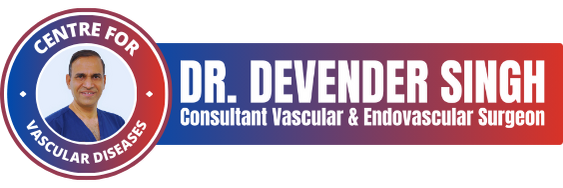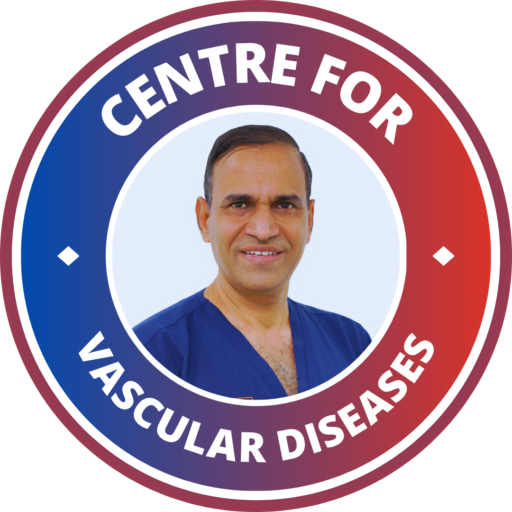Medical and Catheter-Based Therapy for Peripheral Vascular Disease

Medical and Catheter-Based Therapy for Peripheral Vascular Disease: Comprehensive Treatment Approaches
Peripheral vascular disease (PVD) refers to a group of circulatory disorders that affect blood vessels outside the heart and brain, primarily those supplying the arms and legs. Medical and catheter-based therapies play crucial roles in managing PVD, aiming to relieve symptoms, improve blood flow, and reduce the risk of complications. Dr. Devender Singh, a distinguished vascular surgeon in Hyderabad, specialises in providing comprehensive treatment approaches for PVD, incorporating both medical management and catheter-based interventions to optimise patient outcomes.
Understanding Medical and Catheter-Based Therapy for Peripheral Vascular Disease:
Medical therapy for PVD involves the use of medications to alleviate symptoms, control risk factors, and improve circulation. These medications may include antiplatelet agents, anticoagulants, cholesterol-lowering drugs, blood pressure medications, and medications to improve peripheral blood flow. Catheter-based interventions, on the other hand, utilise minimally invasive techniques to restore blood flow in narrowed or blocked arteries. These interventions may include angioplasty, stent placement, atherectomy, thrombectomy, and embolisation, performed using catheters inserted through small incisions in the skin.
Treatment Overview:
Medical Therapy:
- Antiplatelet Agents: Medications such as aspirin or clopidogrel are prescribed to prevent blood clots from forming in the arteries, reducing the risk of thrombosis and subsequent complications.
- Anticoagulants: Blood-thinning medications such as warfarin or direct oral anticoagulants (DOACs) may be used to prevent or treat blood clots in patients with PVD.
- Lipid-Lowering Drugs: Statins are commonly prescribed to lower cholesterol levels and reduce the risk of atherosclerosis progression in patients with PVD.
- Blood Pressure Management: Medications to control high blood pressure (hypertension) are essential in managing PVD and reducing the risk of cardiovascular events.
- Symptom Management: Medications such as cilostazol or pentoxifylline may be used to improve symptoms such as leg pain (claudication) and enhance exercise tolerance in patients with PVD.
Catheter-Based Interventions:
- Angioplasty: In angioplasty, a balloon-tipped catheter is used to widen narrowed or blocked arteries by compressing the plaque against the arterial wall, restoring blood flow.
- Stent Placement: Stents may be deployed during angioplasty to provide structural support and prevent arterial re-narrowing (restenosis) by holding the artery open.
- Atherectomy: Atherectomy involves the removal of plaque from the inner lining of the artery using specialized catheters equipped with cutting or shaving devices.
- Thrombectomy: Thrombectomy is performed to remove blood clots (thrombi) from blocked arteries, restoring blood flow and preventing tissue damage.
- Embolisation: In embolisation, tiny particles or coils are delivered through a catheter to block abnormal blood vessels or divert blood flow away from diseased areas.
Benefits of Medical and Catheter-Based Therapy for Peripheral Vascular Disease:
- Symptom Relief: Medical therapy and catheter-based interventions can alleviate symptoms such as leg pain, cramping, and numbness associated with PVD, improving quality of life.
- Improved Blood Flow: Catheter-based interventions restore blood flow in narrowed or blocked arteries, reducing the risk of tissue damage, limb ischemia, and limb loss.
- Prevention of Complications: Medical therapy helps control risk factors such as high blood pressure, high cholesterol, and diabetes, reducing the risk of cardiovascular events and complications associated with PVD.
- Minimally Invasive: Catheter-based interventions are minimally invasive and can often be performed on an outpatient basis, resulting in shorter recovery times and reduced risk of complications compared to traditional open surgery.
Dr. Devender Singh: Expert Vascular Surgeon in Hyderabad
Dr. Devender Singh is a highly skilled vascular surgeon known for his expertise in managing PVD with medical and catheter-based therapies. With a patient-centred approach and dedication to excellence in vascular care, Dr. Singh provides comprehensive evaluations, personalised treatment plans, and compassionate support to patients with peripheral vascular disease.
If you or a loved one require treatment for peripheral vascular disease, schedule a consultation with Dr. Devender Singh today. With his specialised knowledge and state-of-the-art techniques, Dr. Singh can help you understand your treatment options and develop a personalised plan to improve your vascular health and overall well-being.

